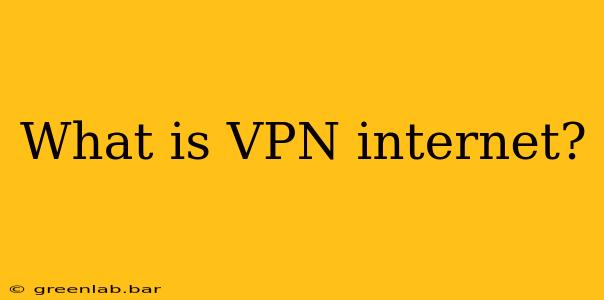The internet has become an indispensable part of modern life, but with its convenience comes inherent risks. Our online activities are constantly tracked, and our data is vulnerable to interception. This is where a VPN, or Virtual Private Network, comes in. This comprehensive guide will explain what VPN internet is, how it works, and why it's become an essential tool for many internet users.
Understanding VPN Internet: A Simple Analogy
Imagine you're sending a postcard. Without encryption, anyone could read your message. A VPN is like putting your postcard in a sealed, addressed envelope. Only the intended recipient (the website you're visiting) can open and read it. Your internet service provider (ISP) and others can see that you're sending a postcard, but they can't see the contents.
How Does a VPN Work?
A VPN creates a secure, encrypted connection between your device and a VPN server. When you connect to the internet through a VPN, your data is routed through this server, masking your IP address and encrypting your online activity. This means:
- Your IP address is hidden: Your ISP and other third parties can't see your real IP address, making it more difficult to track your online activity.
- Your data is encrypted: Your internet traffic is scrambled, making it unreadable to anyone intercepting it, including hackers and government agencies.
- Your location is masked: Connecting to a VPN server in a different location makes it appear as though you're browsing from that location.
Benefits of Using a VPN for Internet Access
Using a VPN offers several key benefits:
Enhanced Privacy
This is arguably the most significant advantage. A VPN shields your online activity from prying eyes, protecting your browsing history, search queries, and other sensitive data.
Improved Security
By encrypting your data, a VPN adds a crucial layer of security, protecting you from cyber threats such as malware and phishing attacks, particularly on public Wi-Fi networks.
Bypassing Geo-Restrictions
Many websites and streaming services restrict content based on geographic location. A VPN can help you bypass these restrictions by masking your location and accessing content that's otherwise unavailable in your region.
Increased Anonymity
A VPN adds a layer of anonymity to your online activities, making it harder for advertisers, trackers, and other entities to build profiles of your behavior.
Choosing the Right VPN: Key Considerations
Not all VPNs are created equal. When selecting a VPN, consider factors such as:
- Security protocols: Look for strong encryption protocols like OpenVPN or WireGuard.
- Server locations: A wider range of server locations offers greater flexibility in bypassing geo-restrictions.
- No-logs policy: Ensure your chosen VPN provider has a strict no-logs policy, meaning they don't store records of your online activity.
- Speed and performance: A slow VPN can significantly impact your browsing experience.
VPN Internet: Is it for Everyone?
While VPNs offer numerous advantages, they're not without potential drawbacks. VPNs can slightly reduce internet speed, and some free VPNs may compromise your privacy or security. However, for those who value online privacy and security, the benefits often outweigh the drawbacks. Consider your individual needs and risk tolerance before deciding if a VPN is right for you.
Conclusion: Navigating the Internet Safely and Privately
VPN internet offers a powerful way to enhance your online privacy and security. By understanding how VPNs work and choosing a reputable provider, you can navigate the internet with greater confidence, knowing that your data is protected and your identity is masked. Remember to always research and choose a VPN provider carefully, prioritizing security and privacy features.

